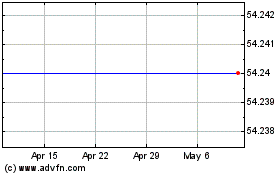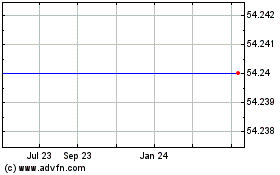Fed Sends BB&T Cease-and-Desist Order Over Anti-Money-Laundering Issues -- Update
January 27 2017 - 2:04PM
Dow Jones News
By Katy Burne and Rachel Louise Ensign
The Federal Reserve said Friday that it had issued a
cease-and-desist order to BB&T Corp. over alleged deficiencies
in its anti-money-laundering controls, rounding out the latest in a
series of actions against the bank for recent failures in such
policies.
The cease-and-desist order, which is on the more severe end of
the Fed's enforcement scale, means the bank must show it is
complying with anti-money-laundering rules until the central bank
removes or otherwise modifies the order.
The Fed's action, which came with the firm's consent, followed
another supervisory action issued to BB&T, based in
Winston-Salem, N.C., last year by the Federal Deposit Insurance
Corp. and North Carolina Commissioner of Banks. That order also
came with the bank's consent. BB&T, which had $219.3 billion in
assets as of Dec. 31, disclosed the likely consent order with the
Fed in a December securities filing.
Brian Davis, a BB&T spokesman, said the firm has a "long
history of quickly addressing regulatory concerns," and has already
made "significant enhancements" to its anti-money laundering
compliance program. He said the firm is "committed to working
alongside our regulatory partners to implement the needed
improvements as quickly as possible."
Such orders don't state that the bank has laundered money, but
rather that their internal systems for detecting criminal activity
and reporting it to the government are deemed unsound by
regulators. The policing of such violations has become more severe
since the financial crisis.
The Fed's order, taken Wednesday with mutual agreement by the
North Carolina Commissioner of Banks, follows a recent inspection
by the Federal Reserve Bank of Richmond, which said it had
identified gaps in BB&T's anti-money-laundering controls.
It requires BB&T to adopt measures to reassure the Fed and
other regulators that it is taking corrective steps. These steps
include submitting written plans within 60 days to ensure enhanced
oversight of the controls by the firm's board of directors, and
progress reports at the end of each quarter.
The Fed's order said BB&T had to adopt "a firm-wide
compliance risk management program designed to ensure compliance
with all applicable laws, rules and regulations relating to
anti-money laundering, including compliance with the Bank Secrecy
Act."
The bank has been one of the few acquisitive large banks, and
the consent order likely halts its mergers-and-acquisitions
appetite. Banks generally can't acquire other lenders when they are
under such an order, though Chief Executive Kelly King said on
BB&T's recent earnings call that the bank could still do
nonbank deals like buying firms in the insurance industry.
A number of other regional banks are also under consent orders.
The orders themselves, and the elevated costs for compliance
systems and personnel to deal with them, often drag on longer than
banks expect.
Write to Katy Burne at katy.burne@wsj.com and Rachel Louise
Ensign at rachel.ensign@wsj.com
(END) Dow Jones Newswires
January 27, 2017 13:49 ET (18:49 GMT)
Copyright (c) 2017 Dow Jones & Company, Inc.
BB and T (NYSE:BBT)
Historical Stock Chart
From Aug 2024 to Sep 2024

BB and T (NYSE:BBT)
Historical Stock Chart
From Sep 2023 to Sep 2024
